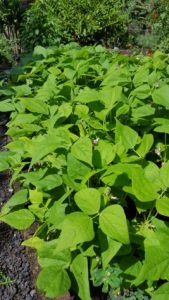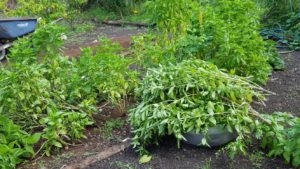By: Dara Downs, Alumni & Family Services Liaison

Green beans thriving at Reeds Bay
In mid April of 2016 we started the Eat Local Initiative at our Young Adult Program at Reeds Bay. This initiative was designed to help track the amount of produce being harvested, being cooked, as well as to help create motivation in the student milieu. It’s set up so that every time we grow and harvest food from our gardens, we weigh it, clean in, and document it. Then when it’s time for meal prep, we check to see if any of our freshly harvested produce can be cooked with that meal. If this is the case, then the food is used during that meal and documented. At the end of the month, based on how much home grown produce was cooked in our meals, the students are given a stipend to spend on specialty or rare items to use in the kitchen. In the past student have purchased cacao nibs, fruit leathers, passion fruit, dried spiced bananas, coconuts, ulu flower, and other island treats.
I work closely with Annette Nickontro, our Young Adult Kitchen Manager, who is really hands on in motivating students to use produce from the garden. She oversees every part of the kitchen, working directly with students in creating weekly menus and recipes. For many students, wandering the garden to collect herbs and produce is a whole new experience. Annette notes, “It’s been exciting to see the students pulling produce they grew from seeds and creating some amazing recipes for things like hot sauce, pesto, leafy green stir-fries, and kale chips!” It’s a wonderful collaboration for both Annette and I to help students see their potential in gardening and cooking from something so small as a seed and feeding their fellow students.
Working together we found that since the Eat Local Initiative started, we have harvested 990 pounds of produce from our gardens, and of that, we have cooked 490 pounds of food! With these numbers, we concluded that we are harvesting approximately 55 pounds of food per month and we are preparing about 27 pounds of food from our gardens per month.

Basil harvest for fresh pesto!
Once I found out how close we were to reaching 1000 pounds, I told our current students, and their immediate response was, “What?! Only 10 pounds away from 1000, we are so close, let’s keep eating what we grow! That’s a crazy amount of food.” Soon after, Annette and the students harvested 12 pounds of Basil and made a bunch of pesto to freeze for the winter! So we are happy to say that after a year and a half we have reached 1000 pounds of harvested produce from our gardens. When asked to comment, PQ’s Horticultural Therapy, Travis Slagle, M.A. said, “The need for self-sufficiency is both practical and emotional. The young people we serve benefit by knowing where their food comes from and taking an active role in sustaining their community. At PQ, we believe the experience of self-sufficiency is transferable and relevant across the lifespan.”
With the Eat Local Initiative in place, we are focused on creating realistic goals and continuing to build a self sustaining agricultural model at PQ. We are excited to celebrate this accomplishment!
Eat Local Initiative at PQ!
By: Dara Downs, Alumni & Family Services Liaison In mid April of 2016 we started the Eat Local Initiative at our Young Adult Program at Reeds Bay. This initiative was designed to help track the amount of produce being harvested, being cooked, as well as to help create motivation in the student milieu. It’s set …
By: Dara Downs, Alumni & Family Services Liaison
Green beans thriving at Reeds Bay
In mid April of 2016 we started the Eat Local Initiative at our Young Adult Program at Reeds Bay. This initiative was designed to help track the amount of produce being harvested, being cooked, as well as to help create motivation in the student milieu. It’s set up so that every time we grow and harvest food from our gardens, we weigh it, clean in, and document it. Then when it’s time for meal prep, we check to see if any of our freshly harvested produce can be cooked with that meal. If this is the case, then the food is used during that meal and documented. At the end of the month, based on how much home grown produce was cooked in our meals, the students are given a stipend to spend on specialty or rare items to use in the kitchen. In the past student have purchased cacao nibs, fruit leathers, passion fruit, dried spiced bananas, coconuts, ulu flower, and other island treats.
I work closely with Annette Nickontro, our Young Adult Kitchen Manager, who is really hands on in motivating students to use produce from the garden. She oversees every part of the kitchen, working directly with students in creating weekly menus and recipes. For many students, wandering the garden to collect herbs and produce is a whole new experience. Annette notes, “It’s been exciting to see the students pulling produce they grew from seeds and creating some amazing recipes for things like hot sauce, pesto, leafy green stir-fries, and kale chips!” It’s a wonderful collaboration for both Annette and I to help students see their potential in gardening and cooking from something so small as a seed and feeding their fellow students.
Working together we found that since the Eat Local Initiative started, we have harvested 990 pounds of produce from our gardens, and of that, we have cooked 490 pounds of food! With these numbers, we concluded that we are harvesting approximately 55 pounds of food per month and we are preparing about 27 pounds of food from our gardens per month.
Basil harvest for fresh pesto!
Once I found out how close we were to reaching 1000 pounds, I told our current students, and their immediate response was, “What?! Only 10 pounds away from 1000, we are so close, let’s keep eating what we grow! That’s a crazy amount of food.” Soon after, Annette and the students harvested 12 pounds of Basil and made a bunch of pesto to freeze for the winter! So we are happy to say that after a year and a half we have reached 1000 pounds of harvested produce from our gardens. When asked to comment, PQ’s Horticultural Therapy, Travis Slagle, M.A. said, “The need for self-sufficiency is both practical and emotional. The young people we serve benefit by knowing where their food comes from and taking an active role in sustaining their community. At PQ, we believe the experience of self-sufficiency is transferable and relevant across the lifespan.”
With the Eat Local Initiative in place, we are focused on creating realistic goals and continuing to build a self sustaining agricultural model at PQ. We are excited to celebrate this accomplishment!
Questions? Call or Text our Admissions Team: 808-937-5806